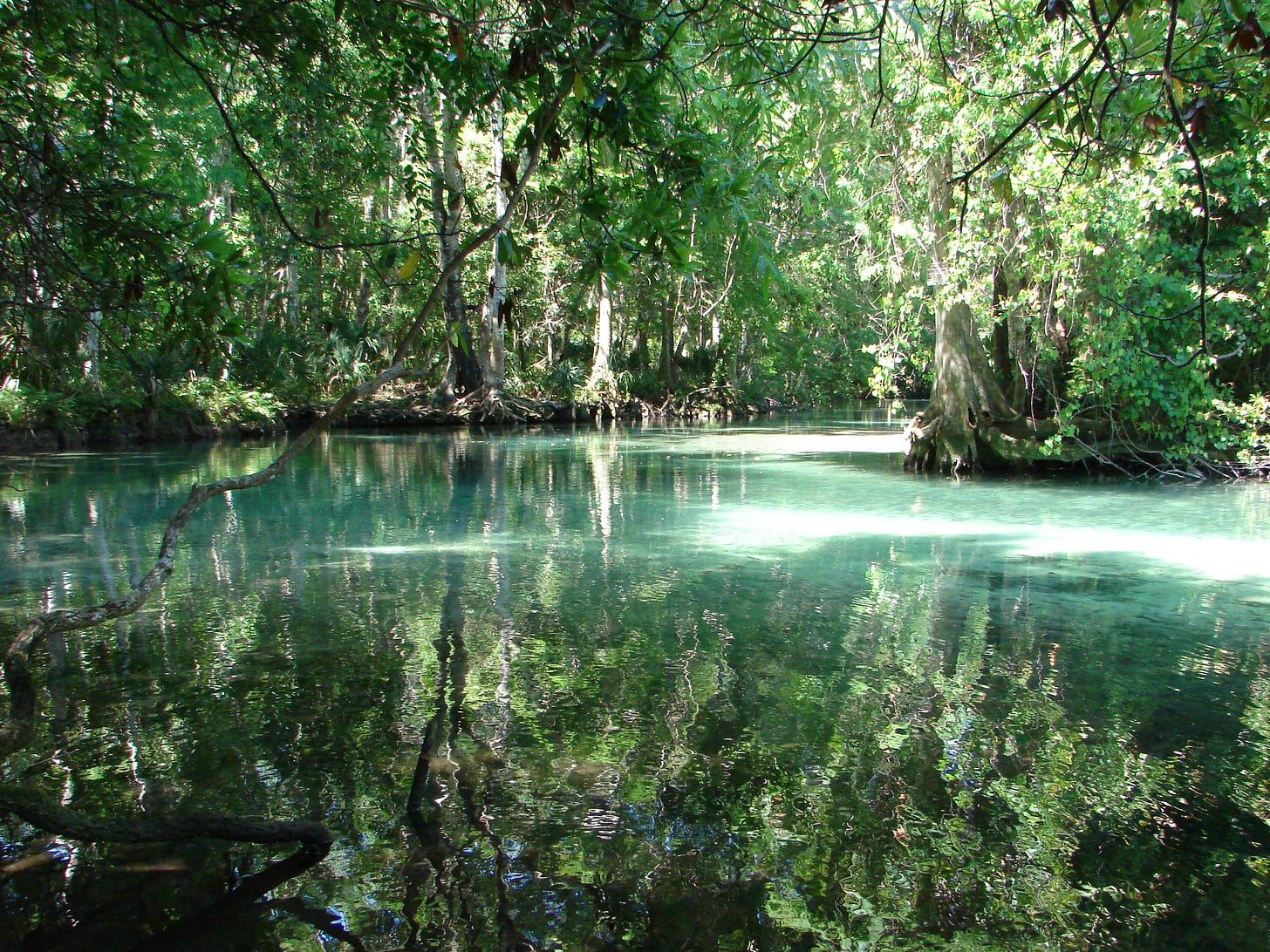Lobbyists and lawmakers team up to take down environmental groups
A five-year campaign to handcuff environmental groups is continuing this session in the Florida Capitol.

This is Seeking Rents, a newsletter and podcast devoted to producing original journalism — and lifting up the journalism of others — that examines the many ways that businesses influence public policy across Florida, written by Jason Garcia. Seeking Rents is free to all. But please consider a voluntary paid subscription, if you can afford one, to help support our work.
Five years ago, on the second-to-last day of the 2019 legislative session, Florida lawmakers slipped an extra favor for developers into an affordable housing bill.
The last-minute provision, which opponents later called “a sneak attack on sane development,” made it far more financially dangerous for environmental groups to sue local governments that flout environmental laws when they approve development orders.
That sneak attack was, it turns out, merely an opening salvo.
Four years later, Florida’s Republican-controlled Legislature passed a second bill that made it made it more dangerous for environmental groups to sue local governments that inappropriately change their long-term growth plans.
And now, GOP lawmakers in Tallahassee are pressing forward with a third piece of legislation meant to stop environmental groups from suing state agencies, too.
The net effect would be to neuter the state laws that are supposed to keep water clean, prevent pollution, and preserve habitat for animals like Florida panthers and black bears — by undermining organizations that make sure everyone follows those rules.
“If you guys don’t want your laws enforced, change the laws,” Ryan Smart, the executive director of the Florida Springs Council, told the Senate Environment and Natural Resources Committee last week. “Get rid of the environmental laws. Then we won’t have anything to sue on.”
Smart made the comments just moments before senators voted 5-2 in favor of Senate Bill 738, a bill that would change the way attorney fees are calculated in lawsuits against the state that challenge actions like giving developers permits to pave over wetlands or pump more water out of the ground.
In most lawsuits in Florida, each side usually pays for their own lawyers. But SB 738 (and House Bill 789) would change the rules for suits against the Florida Department of Environmental Protection or any of the state’s five water-management districts.
In those cases, the losing side would have to pay for the winning side’s lawyers, too.
This is known as “fee shifting.” And it’s the exact same thing that the Florida Legislature and Gov. Ron DeSantis did with House Bill 7103 in 2019, which imposed fee shifting in lawsuits challenging development orders, and with Senate Bill 540 in 2023, which imposed fee shifting in suits challenging comprehensive plan amendments.
Shifting responsibility for legal fees in environmental litigation has been a long-term project for some of Florida’s biggest business lobbying groups — including Associated Industries of Florida and the Florida Chamber of Commerce, whose members include industrial firms like Florida Power & Light, U.S. Sugar Corp., and Mosaic Co., as well as the Florida Home Builders Association and the Association of Florida Community Developers, which specifically represent housing developers like Lennar Homes.
Boosters say fee-shifting is a way to block bogus lawsuits that serve only to slow projects down and drive up development costs. “We believe that is a great way to raise the standard and bring merit-based challenges,” Adam Basford, a lobbyist for Associated Industries, told the Senate Environment and Natural Resources Committee.
Except Florida already has laws on the books that give judges the power to punish frivolous litigants — including by making them pay the legal fees of someone they sue without good reason.
What these particular laws are really trying to do is shut down environmental challenges entirely.
The problem is that city councils, county commissioners and state agencies don’t always fully enforce or faithfully follow environmental rules — especially when influential corporate interests like homebuilders or sugar growers or phosphate miners don’t like those rules.
Here’s just one example: In 2016, the Florida Legislature passed bipartisan legislation meant to save more than two dozen freshwater springs across the state that were dying amid excessive pumping and corrupting pollution.
But when it came time to implement the new law, both the Rick Scott and Ron DeSantis administrations dragged their feet for years. Organizations including the Florida Springs Council had to sue the Department of Environmental Protection into doing its job.
And it wasn’t just a bunch of liberal activist groups who thought Florida’s executive branch was failing to enforce the new springs law. One of the key architects of the legislation — a former Republican state senator — also said DEP failed to do its duty.
But the Springs Council may never have sued in the first place had it had been at risk of paying DEP’s legal tab if it lost. A lawsuit would have been an enormous financial gamble.
That’s because attorney fees can escalate rapidly. Complex litigation can take years to resolve. And the state of Florida frequently spends lavishly on outside lawyers, especially under the DeSantis administration, which has paid some favored law firms nearly $700 an hour.
In addition, suits challenging actions like land-use changes or wetlands-dredging permits often draw in deep-pocketed corporate interests as intervenors. Fee-shifting puts environmental group at risk of having to pay those companies’ legal bills, too. In another recent case, for instance, the Florida Springs Council challenged a permit giving bottled-water giant Nestlé nearly 1 million gallons a day from a North Florida spring.
To underscore just how expensive attorney fees can get: A few politically plugged-in lawyers have been trying to get DeSantis and the Legislature to give them more than $6 million in taxpayer money to cover fees they say they incurred while suing to kill a transportation tax in Tampa.
This isn’t the only way that DeSantis and the Legislature have used attorney fees to stack the deck for favored interest groups.
For instance, while lawmakers have shifted fees in a way that weakens environmental groups that want to enforce laws, they have simultaneously shifted fees in a way that empowers businesses that want to block laws.
Specifically, lawmakers last year passed Senate Bill 170, which allows a business that successfully sues to stop a local law to then make the city or county that passed the law pay the business’ legal fees.
Unfortunately, Florida homeowners who are being jerked around by an insurance company that won’t pay claims haven’t been so lucky in Tallahassee. They used to have more power to make insurers pay their legal bills — but DeSantis and the Legislature took that power away.




What's really disingenuous are the Republicans to claim to be protecting the environment in Florida. LIARS!!! All of the crap they throw at the public regarding culture wars is just cover for the underhanded destruction of Florida's natural beauty. The Governor is the lead culprit, the rest are doing his bidding. I guess we can see shiney new cars and pools at some of their homes soon.
Year after year, session after session, the Florida Republican Mafia has handcuffed the average citizen and environmental groups from protecting the very places they call home. If this keeps up, gone are the green spaces and natural water filtering system only to replaced with dirty, tainted water. Have we not learned the lessons of perhaps Flint Michigan and other dirty water destinations? Florida was once known as an agricultural state but those days are coming to an end. Don't kid yourself, it's coming. Developers are busy laying the groundwork to poison every green space they can. You think flooding is an issue now?? Wait a few years as it gets exponentially worse as developers build and at the same time destroy Florida's ability to naturally move excess water away. Too many developments are not even elevated enough to alleviate storm water as the myriad of retention ponds, catch basins are undersized to handle the new excessive rain amounts. At last check Florida is on the plain, where's the water going to go?? To the Florida voters, you had better get involved in the process before it's too late. One party rule will destroy the Florida you once knew. Joni Mitchell sang it best...."they paved paradise to put up a parking lot"......